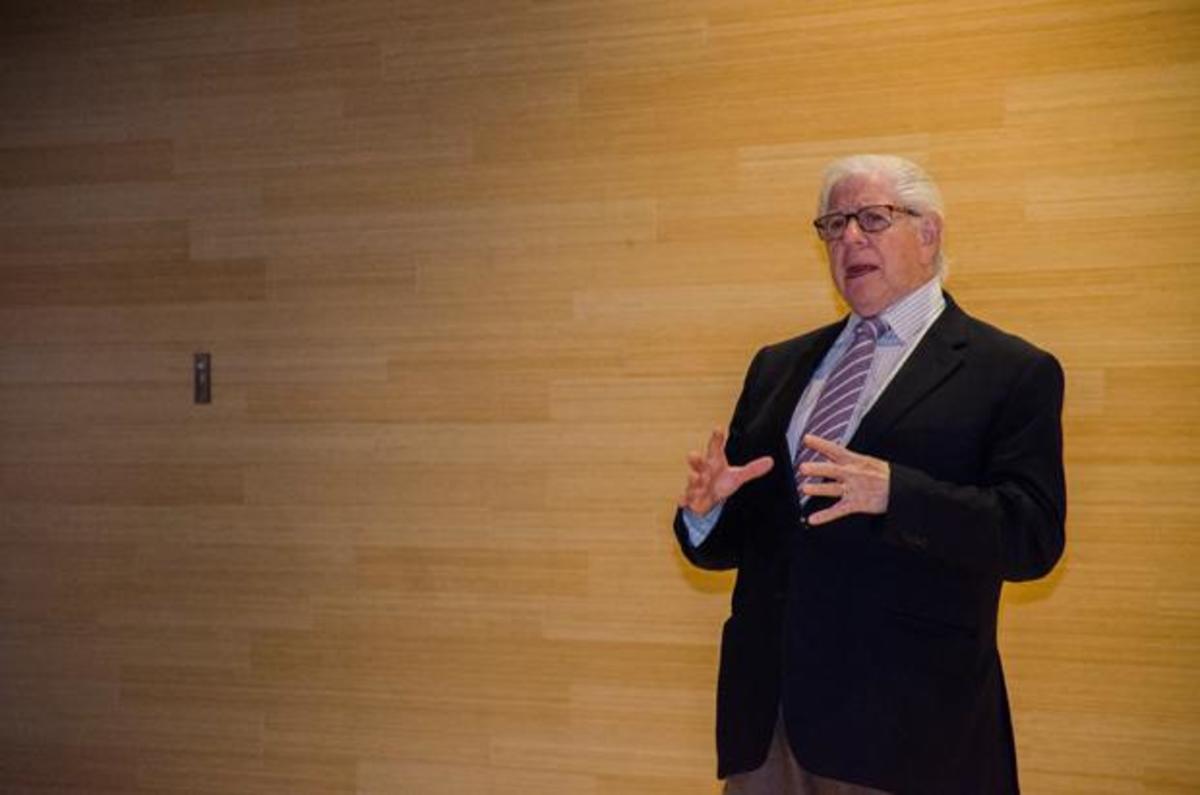
Photo by Robert Curtis
Although his trip to the University of North Florida was about the current state of American journalism and politics, the famed journalist Carl Bernstein was able to spare a moment of his time to talk about something else that interests him—his son, Max Bernstein.
“Here, you want to see something?,” asked Carl Bernstein as he took out his iPhone and scrolled through it. “I think you’ll get a kick out of this.”
Bernstein pulled out a self-taken video of his son performing an impressive guitar solo in front of a roaring crowd.
“Watch the guitar player…that’s my son, Max, Demi Lovato’s guitar player,” he said.
Bernstein is a smart man. He was smart enough to help expose Richard Nixon in the Watergate scandal, smart enough to write several best-selling books about the lives of both Hillary Clinton and the late Pope John Paul II, and smart enough to know that amidst all his great success his son’s guitar playing is important enough to share with strangers.
Bernstein visited UNF Friday, Nov. 7, and his lecture went beyond what initially brought him fame. His new contribution to academia focuses on both the decline of American journalism and the effects of ideologies on the political landscape.
Prior to the lecture, Bernstein set aside some time to meet with students and answer questions.
The Q&A
Many questions were about the infamous Watergate scandal, for which he and colleague Bob Woodward won a Pulitzer Prize in 1973. Bernstein answered these questions the way he has answered them a million times before, with a detailed account of the investigative tools it took to reveal the corruption in the Nixon administration.
“The Nixon Administration was a criminal presidency,” Bernstein said.
And while on the topic of presidencies, one of Bernstein’s main focuses in the session was on potential 2016 presidential candidate, Hillary Clinton.
“I think she’s going to run. I think the odds are pretty great,” Bernstein said.
Bernstein had several insights into the current state of American politics.
“Our political system is in terrible trouble. It’s not working,” he said. “One of the three branches of government, the Congress of the United States, is basically totally dysfunctional. Imagine: one of the three branches of the government doesn’t work.”
Bernstein’s Q&A was exceptionally personal, and a wonderful appetizer to his lecture at the Herbert University Center.
The Lecture
Carl Bernstein’s lecture was packed to the brim, and the crowd gave him a thunderous applause when he came on stage.
He began with an anecdotal story which related his personal life to the culture of UNF. The crowd fell silent as he described the ospreys that had nested in his home in Long Island, New York. Once he had everyone’s curiosity peaked, he began his oration on “the system” and the state of media culture.
“Truth has become the acceptance of untruths,” Bernstein said, addressing the younger generation and the production of the new media. “You’ve taken from the system and you’ve broken the system.”
And that was the whole point of Bernstein’s lecture, wrapped and delivered for anyone who is willing to listen.
The system, which Bernstein subtly defines as the media acting as a watchdog for society, has fallen due to sloppy reporting and an unnatural focus on gossip and “manufactured controversy.”
When Bernstein began working at his first job at the Washington Star at age 16, journalists understood what it meant to provide a service to the public. That service was to report accurately and on subjects that could benefit society—a skill that Bernstein feels has become a rarity in the field today.
The rest of his lecture was riddled with questions from an eager audience, which Bernstein was more than willing to satisfy with his distinctive sense of humor, even once admitting that his response was a, “long answer to a short question.”
The crowd snickered with approval.
At the end of his lecture, Bernstein’s confident voice delivered one last important message that will hopefully remain with all who heard it. According to Bernstein journalism is essentially about “the best obtainable version of the truth,” and that the system can be fixed if the younger generation is able to find what it means to work for the common good like the generations before them.
Gallery photos by Robert Curtis.
[doptg id=”68″]Email Joseph Pike at reporter5@unfspinnaker.com







